|
|
| |
|
| |

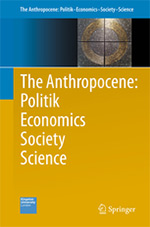
The Anthropocene
Politik – Economics – Society – Science (APESS)
Edited by
Hans Günter Brauch,
AFES-PRESS, chairman
Free University of Berlin (Ret.)
A Peer Reviewed Book Series
ISSN: (Print)
ISSN: (Online)
APESS
Vol 4 |
Hans Günter Brauch, Úrsula Oswald Spring, Juliet Bennett, Serena Eréndira Serrano Oswald (Eds.): Addressing Global Environmental Challenges from a Peace Ecology Perspective (Cham–Heidelberg– New York – Dordrecht – London: Springer-Verlag, 2017).
ISBN: 978-319- (Softcover)
ISBN: 978-319- (EBook)
Doi: 10.1007/978-319-_ (add chapter no.)
Order this book on Springer Website |
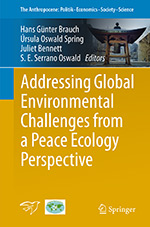
|
| |
|
|
On this book
Addressing Global Environmental Challenges from a Peace Ecology Perspective offers peer-reviewed texts that build on Expanding Peace Ecology and applies this concept to global environmental challenges in the Anthropocene. Hans Günter Brauch (Germany) offers a typology of time and turning points in the 20th century; Juliet Bennett (Australia) discusses the global ecological crisis as resulting from a “tyranny of small decisions”. Katharina Bitzker (Canada) debates “The Emotional Dimensions of Ecological Peacebuilding” by loving nature. Henri Myrttinen (UK) analyses “Preliminary findings on gender, peacebuilding and climate change in Honduras”. Úrsula Oswald Spring (Mexico) offers a critical review of the policy and scientific nexus debate on “The Water, Energy, Food and Biodiversity Nexus” reflecting on the case of security in Mexico. In closing, Brauch discusses whether strategies of sustainability transition may enhance the prospects for achieving sustainable peace in the Anthropocene.
-
Addresses global environmental challenges
-
Focuses on the nexus among biodiversity, water, food, energy and waste
-
Deals with structural violence, the tyranny of small decisions and emotional dimensions of ecological peacebuilding
-
Offers perspectives on sustainable peace by moving towards sustainability transition
Contents
Foreword by Nesrin Kenar, Sec. General, IPRA
Introduction (Hans Günter Brauch – Úrsula Oswald Spring – Juliet Bennett and Serena Eréndira Serrano Oswald) - 2 Historical Times and Turning Points in a Turbulent Century: 1914, 1945, 1989 and 2014? (Hans Günter Brauch) -3 Global Ecological Crisis: Structural violence and the tyranny of small decisions (Juliett Bennett) - 4 Loving Nature: The Emotional Dimensions of Ecological Peacebuilding (Katherina Bitzker) - 5 Drowning in complexity? Preliminary findings on addressing gender, peacebuilding and climate change in Honduras (Henri Myrttinen) - 6 The Water, Energy, Food and Biodiversity Nexus: New Security Issues in the Case of Mexico (Úrsula Oswald Spring) - 7 Building Sustainable Peace by Moving Towards Sustainability Transition (Hans Günter Brauch) – 8 Conclusions (Serena Eréndira Serrano Oswald)
Backmatter: On IPRA and on EPC – On the Editors and Contributors – On the Book
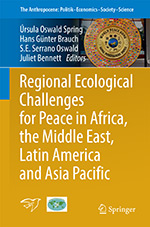 |
APESS
Vol 5 |
Úrsula Oswald Spring, Hans Günter Brauch, Serena Eréndira Serrano Oswald, Juliet Bennett (Eds.): Regional Ecological Challenges for Peace in Africa, the Middle East, Latin America and Asia Pacific (Cham– New York – Heidelberg – Dordrecht – London: Springer International Publishing, 2017).
ISBN: 978-319- (Softcover)
ISBN: 978-319- (EBook)
Doi: 10.1007/978-319-_ (add chapter no.)
Order this book on Springer Website |
| |
|
|
On this book
Regional Ecological Challenges for Peace in Africa, the Middle East, Latin America and Asia Pacific contains peer-reviewed texts from IPRA’s EPC. M.I. Abazie-Humphrey (Nigeria) reviews “The Nigeria Home-Grown DDR Programme”. C. Christian and H. Speight (USA) analyse “Water, Cooperation, and Peace in the Palestinian West Bank”. T. Galaviz (Mexico) discusses “The Peace Process Mediation Network between the Colombian Government and the April 19th Movement”. S.E. Serrano Oswald (Mexico) examines “Social Resilience and Intangible Cultural Heritage: Case Study in Mexico”. A. and F. Rashid (Pakistan) and F. Feng (China) focus on “Community Perceptions of Ecological Disturbances Caused During Terrorists Invasion and Counter-insurgency Operations in Swat, Pakistan”. M. Yoshii (Japan) examines “Structure of Discrimination in Japan’s Nuclear Export”. Finally, S. Takemine (Japan) studies “‘Global Hibakusha’ and the Invisible Victims of the U.S. Nuclear Testing in the Marshall Islands”.
Foreword: Ibrahim Shaw, Secretary-General, IPRA.
1 Introduction (Oswald Spring, Brauch, Bennett; Serrano Oswald) - 2 The Nigeria Home-Grown DDR Programme (Abazie-Humphrey - 3 Water, Cooperation, and Peace in the Palestinian West Bank (Christian, Fisher, Jackson, Kehoe, Owen, Puleo, Rosner, Speight) - 4 The Peace Process Mediation Network between the Colombian Government and the April 19th Movement (Galvaniz) - 5 Social Resilience and Intangible Cultural Heritage: Case Study in Mexico (Serrano Oswald) - 6 Community Perceptions of Ecological Disturbances Caused During Terrorists Invasion and Counter-insurgency Operations in Swat, Pakistan ( Rashid, Feng, Rashid) - 7 Structure of Discrimination in Japan’s Nuclear Export (Yoshii) - 8 Overlooked Invisible Victims of the U.S. Nuclear Testing in the Marshall Islands (Takemine) - 9 Reflections on Moving Toward Ecological Civilization and Positive Peace (Bennett). – Backmatter:
On the Editors
 |
Juliet Bennett (Australia) is a PhD Candidate at the Centre for Peace and Conflict Studies, the University of Sydney. Her research explores an interface between ecology, religion and peace. Juliet has presented her research at international conferences and published papers in academic journals and edited books. She has taught at Lenoir Rhyne University, North Carolina as well as at The University of Sydney. Juliet has been the Executive Officer of the Sydney Peace Foundation since 2012, and in 2014 she became a co-convener of the Peace and Ecology Commission (EPC) of the International Peace Research Association (IPRA).
Address: Centre for Peace and Conflict Studies, Mackie Building K01, The University of Sydney NSW 2006
Email: <juliet.bennett@sydney.edu.au>
Website: <<http://www.julietbennett.com>
|
Hans Günter Brauch (Germany), Dr., Adj. Prof. (Privatdozent) at the Faculty of Political and Social Sciences, Free University of Berlin; since 1987 chairman of Peace Research and European Security Studies (AFES-PRESS). He is editor of the Hexagon Book Series on Human and Environmental Security and Peace (HESP), and of SpringerBriefs in Environment, Security, Development and Peace (ESDP) and of the SpringerBriefs ob Pioneeres in Science and Practice with Springer-Verlag, He was guest professor of international relations at the universities of Frankfurt on Main, Leipzig, Greifswald, and Erfurt; research associate at Heidelberg and Stuttgart universities, and a research fellow at Har¬vard and Stanford Universities. In fall and winter 2013/2014 he was a guest professor at Chulanlongkorn University in Bangkok. He published on security, armament, climate, energy, and migration, and on Mediterranean issues in English and German, was translated into Spanish, Greek, French, Danish, Finnish, Russian, Japanese, Portuguese, Serbo-Croatian, and Turkish. Recent books in English: (co-ed. with Liotta, Marquina, Rogers, Selim): Security and Environment in the Mediterranean. Conceptualising Security and Environmental Conflicts, 2003; (co-ed. with Oswald Spring, Mesjasz, Grin, Dunay, Chadha Behera, Chourou, Kameri-Mbote, Liotta): Globalization and Environmental Challenges: Reconceptualizing Security in the 21st Century, 2008; (co-ed. with Oswald Spring, Grin, Mesjasz, Kameri-Mbote, Chadha Behera, Chourou, Krummenacher): Facing Global Environmental Change: Environmental, Human, Energy, Food, Health and Water Security Concepts (2009); (co-ed. with Oswald Spring): Reconceptualizar la Seguridad en el Siglo XXI (2009); (co-ed. with Oswald Spring, Mesjasz, Grin, Kameri-Mbote, Chourou, Dunay, Birkmann), Coping with Global Environmental Change, Disasters and Security – Threats, Challenges, Vulnerabilities and Risks (2011); (co-ed with Scheffran, Brzoska, Link, Schilling).
Address: PD Dr. Hans Günter Brauch, Alte Bergsteige 47, 74821 Mosbach, Germany.
Email: <brauch@afes-press.de>.
Website: < http://www.afes-press.de> and <http://www.afes-press-books.de/>.
|
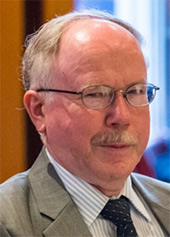
|
| |
|
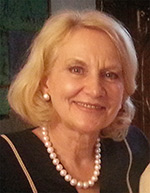 |
Úrsula Oswald Spring (Mexico), full time Professor/Researcher at the National University of Mexico (UNAM) in the Regional Multidisciplinary Research Center (CRIM), she was national coordinator of water research for the National Council of Science and Technology (RETAC-CONACYT), first Chair on Social Vul¬ne¬rability at the United National University Institute for Environ¬ment and Human Security (UNU-EHS); founding Secretary-General of El Colegio de Tlaxcala; General Attorney of Ecology in the State of Morelos (1992-1994), National Delegate of the Federal General Attorney of Environ-ment (1994-1995); Minister of Ecological Development in the State of Morelos (1994-1998). She was President of the International Peace Research Association (IPRA, 1998-2000), and General Secretary of the Latin-American Council for Peace Research (2002-2006). She studied medicine, clinical psychology, anthropology, ecology, classical and modern languages. She obtained her Ph.D. from University of Zürich (1978). For her scientific work she received the Price Sor Juana Inés de la Cruz (2005), the Environmental Merit in Tlaxcala, Mexico (2005, 2006), UN Development Prize. She was recognized as Women Academic in UNAM (1990 and 2000); and Women of the Year (2000). She works on non-violence and sustainable agriculture with groups of peasants and women and is President of the Advisory Council of the Peasant University. She has written 46 books and more than 328 scientific articles and book chapters on sustainability, water, gender, development, poverty, drug consumption, brain damage due to under-nourishment, peasantry, social vulnerability, genetic modified organisms, bioethics, and human, gender, and environmental security, peace and conflict resolution, democracy, and conflict negotiation.
Address: Prof. Dr. Úrsula Oswald Spring, CRIM-UNAM, Av. Universidad s/n, Circuito 2, Col. Chamilpa, Cuernavaca, CP 62210, Mor., Mexico.
Email: <uoswald@gmail.com>.
Website: <http://www.afes-press.de/html/download_oswald.html>.
|
| |
|
Serena Eréndira Serrano Oswald (Mexico) is research professor at the Regional Multidisciplinary Research Centre, National Autono-mous University of Mexico (CRIM-UNAM). She holds a PhD in Social Anthropology (UNAM), an MSc in Social Psychology (LSE), an MFT in Systemic Family Therapy (CRISOL), and a BA Hons in Political Studies and History (SOAS). She has a Postdoctorate in Sociology and Gender (UNAM), a professional diploma in translation and interpreting (Institute of Linguists), a specialized training in couples therapy, in psychopathology (CRISOL), and person-centred therapy (Gestalt Institute). Certified by the National Council of Researchers (SNI I), she is currently president of the Mexican Association of Regional Development (AMECIDER).
Address: Dr. Serena Eréndira Serrano Oswald, Priv. Rio Bravo No. 1, Col. Vista Hermosa, Cuernavaca, Morelos, Mexico CP 62290.
Email: <sesohi@gmail.com>
|
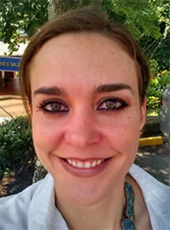
|
| |
|
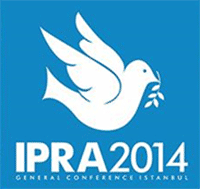
On International Peace Research Association (IPRA)
Founded in 1964, the International Peace Research Association (IPRA) developed from a conference organized by the "Quaker International Conferences and Seminars" in Clarens, Switzerland, 16-20 August 1963.The participants decided to hold international Conferences on Research on International Peace and Security (COROIPAS), which would be organized by a Continuing Committee similar to the Pugwash Conferences. Under the leadership of John Burton, the Continuing Committee met in London, 1-3 December 1964. At that time, they took steps to broaden the original concept of holding research conferences. The decision was made to form a professional association with the principal aim of increasing the quantity of research focused on world peace and ensuring its scientific quality.
An Executive Committee including Bert V A. Roling, Secretary General (The Netherlands), John Burton (United Kingdom), Ljubivoje Acimovic (Yugoslavia), Jerzy Sawicki (Poland), and Johan Galtung (Norway) was appointed. This group was also designated as Nominating Committee for a 15-person Advisory Council to be elected at the first general conference of IPRA, to represent various regions, disciplines, and research interests in developing the work of the Association.Since then, IPRA has held 25 biennial general conferences, the venues of which were chosen with a view to reflecting the association's global scope. IPRA, the global network of peace researchers, has just held its 25th General Conference on the occasion of its 50th anniversary in Istanbul, Turkey in August 2014 where peace researchers from all parts of the world had the opportunity to exchange actionable knowledge on the conference broad theme of ‘Uniting for sustainable peace and universal values’.
The 26th IPRA General Conference will take place between November 28 and 1st December in 2016 in Freetown, Sierra Leone on the theme: AGENDA FOR PEACE AND DEVELOPMENT: Conflict prevention, post-conflict transformation, and the Conflict, Disaster and Development Debate.
On IPRA <http://www.iprapeace.org/>
IPRA 2016 Conference Brochure: <http://www.iprapeace.org/images/newsletters/ IPRA% 202016%20Freetown%20%20CONFERENCE%20%20BROCHURE.pdf>
On previous IPRA Conferences:
IPRA 2012 in Mie <https://www.facebook.com/media/set/?set=a. 321841277928978.77587. 320866028026503&type=3 >
IPRA 2014 in Istanbul <https://www.facebook.com/ipra2014 >
On the IPRA Foundation <http://iprafoundation.org/>
International Peace Research Association (IPRA) Conferences,
Secretary Generals and Presidents 1964-2016
IPRA General Conferences
|
IPRA Secretary Generals/Presidents |
- Groningen, the Netherlands (1965)
- Tallberg, Sweden (1967)
- Karlovy Vary, Czechoslovakia (1969)
- Bled, Yugoslavia (1971)
- Varanasi, India (1974)
- Turku, Finland (1975)
- Oaxtepec, Mexico (1977)
- Königstein, FRG (1979)
- Orillia, Canada (1981)
- Győr, Hungary (1983)
- Sussex, England (1986)
- Rio de Janeiro, Brazil (1988)
- Groningen, the Netherlands (1990)
- Kyoto, Japan (1992)
- Valletta, Malta (1994)
- Brisbane, Australia (1996)
- Durban, South Africa (1998)
- Tampere, Finland (2000)
- Suwon, Korea (2002)
- Sopron, Hungary (2004)
- Calgary, Canada (2006)
- Leuven, Belgium (2008)
- Sydney, Australia (2010)
- Mie, Japan (2012)
- Istanbul, Turkey (2014)
- Freetown, Sierra Leone (2016)
|
1964-1971 Bert V. A. Roling (the Netherlands)
1971-1975 Asbjorn Eide (Norway)
1975-1979 Raimo Väyrynen (Finland)
1979-1983 Yoshikazu Sakamoto (Japan)
1983-1987 Chadwick Alger (USA)
1987-1989 Clovis Brigagão (Brazil)
1989-1991 Elise Bouding (USA)
1991-1994 Paul Smoker (USA)
1995-1997 Karlheinz Koppe (Germany)
1997-2000 Bjørn Møller (Denmark)
2000-2005 Katsuya Kodama (Japan)
2005- 2009 Luc Reychler ( Belgium)
2009-2012 Jake Lynch (UK/Australia), Katsuya Kodama (Japan)
2012-2016 Nesrin Kenar (Turkey), Ibrahim Shaw (Sierra Leone/UK) |
Presidents
The first IPRA President was Kevin Clements (New Zealand/USA, 1994-1998).
His successor was Úrsula Oswald Spring (Mexico, 1998-2000).
|
On IPRA’s
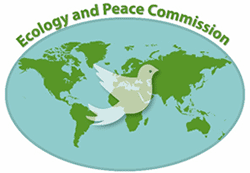
IPRA’s Ecology and Peace Commission (EPC) addresses the relationship between the Earth and human systems, and their impacts on peace. A special focus is placed on the linkages between problems of sustainable development and sustainable peace. The EPC evolved from the Food Study Group, which became Ecology and Peace Commission (EPC). In 2004 an Earth Charter Working Group was also set up. Many wars have been related to resource conflicts and therefore the EPC focused on conflict resolution related to sustainable development and processes of sustainable transition toward ecological civilization.
The conveners are elected by the participants during IPRA conferences for a two year period to prepare the publications for the past conference and to prepare the sessions for the next conference. The conveners between the IPRA conferences in Mie (2012) and Istanbul (2014) were:
-
Úrsula Oswald Spring (CRIM/UNAM, Cuernavaca, Mexico), Full time Professor/Researcher at the National University of Mexico (UNAM) in the Regional Multidisciplinary Research Center (CRIM), lead author of the Intergovernmental Panel on Climate Change (IPCC); Email: <uoswald@gmail.com>.
-
Hans Günter Brauch (Free University of Berlin (ret.), Peace Research and European Security Studies [AFES-PRESS], Mosbach, Germany); Chairman, Peace research and European Security Studies (AFES-PRESS), nonprofit scientific society, Mosbach, Germany (see biography as coeditor); Email: brauch@afes-press.de;
-
Keith G. Tidball (Cornell University, Ithaca. NY, USA), Senior Extension Associate in the Department of Natural Resources where he serves as Associate Director of the Civic Ecology Lab and Program Leader for the Nature & Human Security Program. New York State Coordinator for NY Extension Disaster Education Network; Email: <kgtidball@cornell.edu>.
Based on the presentations of the IPRA conference in Mie (November 2015) they published this peer-reviewed book
In August 2014 in Istanbul the conveners between the IPRA conferences in Istanbul (2014) and in Freetown (2016) were elected:
-
Prof. Dr. Úrsula Oswald Spring (CRIM/UNAM, Cuernavaca, Mexico)
-
PD Dr. Hans Günter Brauch (Free University of Berlin (ret.), Peace Research and European Security Studies [AFES-PRESS], Mosbach, Germany)
-
Juliet Bennett, PhD candidate (Centre for Peace and Conflict Studies, The University of Sydney Australia); Email: <juliet.bennett@sydney.edu.au>.
Based on the presentations of the IPRA conference in Istanbul (August 2014) they published these two peer-reviewed books:
-
Hans Günter Brauch, Úrsula Oswald Spring, Juliet Bennett, Serena Eréndira Serrano Oswald (Eds.): Addressing Global Environmental Challenges from a Peace Ecology Perspective. SpringerBriefs in Environment, Security, Development and Peace, vol. 27. Peace and Security Studies No. 4.
-
Úrsula Oswald Spring, Hans Günter Brauch, Serena Eréndira Serrano Oswald, Juliet Bennett (Eds.): Regional Ecological Challenges for Peace in Africa, the Middle East, Latin America and Asia Pacific. SpringerBriefs in Environment, Security, Development and Peace, vol. 28. Peace and Security Studies No. 5
For the 2016 IPRA Conference the EPC conveners suggest to devote several sessions to the following themes:
-
Sustainability Transformation and Sustainable Peace
-
Developing what? Critical perspectives on sustainable development goals
-
Envisioning and moving toward an environmental civilization
-
Connections between human wellbeing and the wellbeing of the planet
-
Effects of conflict on environment, and solutions
-
Mitigating and adapting to climate change in a peaceful way
-
International Environmental Policy: motivating political will and implementation
-
Holistic approaches to structural violence, connecting issues such as population, gender, poverty, environment, culture, food, water, energy, agriculture, education and economics
-
Additional submitted papers related to environment and peace
It is again planned to publish selected papers as a special issue of a peer-reviewed scientific journal or in a book in this book series. In close consultation and coordination with the two co-conveners, Ursula Oswald Spring and Hans Günter Brauch, the session at the IPRA conference in 2016 will be coordinated by:
-
Juliet Bennett, PhD candidate (Centre for Peace and Conflict Studies, The University of Sydney, Australia); Email: <juliet.bennett@sydney.edu.au>.
-
Prof. Dr. Úrsula Oswald Spring (CRIM/UNAM, Cuernavaca, Mexico)
-
PD Dr. Hans Günter Brauch (Free University of Berlin (ret.), Peace Research and European Security Studies [AFES-PRESS], Mosbach, Germany)
|
|
|